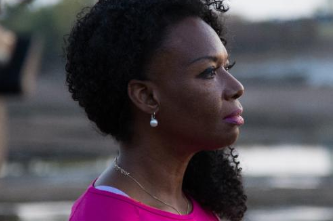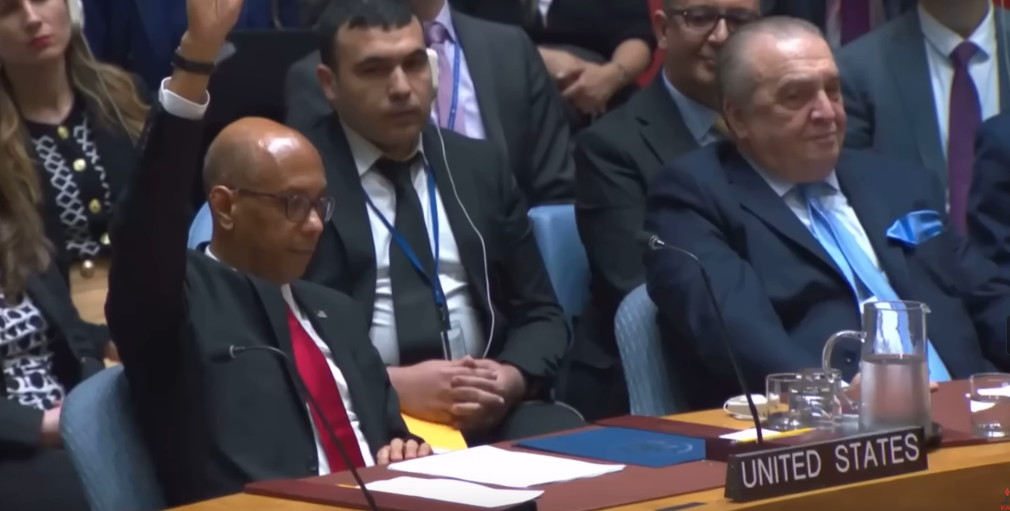Photo: Jonathan Silvers/Saybrook Productions Ltd.
In “Tulsa: The Fire and the Forgotten,” The Washington Post reporter DeNeen L. Brown (above) interviews descendants of Greenwood residents and business owners and today’s community activists.
One of the worst incidents of racial violence in American history occurred 100 years ago, May 31-June 1, 1921.
Known as the Tulsa Race Massacre, a mob of white residents set fire to “Black Wall Street”—hundreds of Black-owned businesses and homes in the Greenwood district of Tulsa, Oklahoma—killing an estimated 100-300 Black residents and leaving an estimated 10,000 Black residents homeless.
The new documentary “Tulsa: The Fire and the Forgotten,” premiering Monday, May 31 at 9 p.m. on PBS (check local listings), pbs.org and the PBS Video app, examines this deadly assault on the 100th anniversary of the crime in the context of other racial massacres and police killings, including the one-year anniversary of the killing of George Floyd (May 25, 2020).
This explosion of racial terror was compounded by the silence that followed. No one was punished for the crimes committed, and history textbooks often made no reference to them, so many Americans are still unaware of this history.
In Tulsa: The Fire and the Forgotten, The Washington Post reporter DeNeen L. Brown interviews descendants of Greenwood residents and business owners and today’s community activists. She asks them about the city’s 2018 decision to search for mass graves from 1921, community demands for reparations and today’s efforts to revive the Black district of Greenwood through education, technology, business development and more.
The documentary also explores issues of atonement, reconciliation and reparations in the past, present and future through the historical lens of white violence and Black resistance.
“Last year, teams of archaeologists and forensic anthropologists found a mass grave in the city-owned cemetery, which may be connected to the massacre,” said Brown. “This spring, the City of Tulsa plans to commemorate the 100th anniversary of the massacre, as descendants of survivors demand reparations for what was lost and protest against current oppression and racism.”
“The Tulsa Race Massacre is an atrocity that is often overlooked in our history,” said Lesley Norman, executive producer for WNET. “With this documentary, we hope to examine the true history of race relations in America while paying respect to the lives lost and celebrating those fighting towards a better future for Black Tulsa residents and for African Americans across the country.”
Tulsa: The Fire and the Forgotten also chronicles present-day public efforts to memorialize the Tulsa Race Massacre and other racial violence around the country, and how Black and white communities view such efforts. The documentary includes interviews with civil rights activists, lawyers and Black community leaders including Greg Robinson II, Kristi Williams and Regina Goodwin, Oklahoma State Representative – Tulsa House District 73. In addition, Eric Stover, founder of the Human Rights Center at University of California, Berkeley School of Law, who has investigated numerous acts of genocide and mass murder over many decades, speaks with Tulsa natives and surveys the current excavation and search for mass graves.
“The film’s power is in hearing the voices and memories of those whose very existence was redefined by this massacre,” said Eugenia Harvey, executive producer for Chasing the Dream. “The unflinching resilience of north Tulsa’s descendants and residents gives inspiration to all Americans seeking truth in our nation’s history.”
Tulsa: The Fire and the Forgotten is a production of Saybrook Productions Ltd. in association with THIRTEEN Productions LLC. Produced and directed by Jonathan Silvers. Produced and reported by DeNeen L. Brown. Produced by Eric Stover. For WNET’s Chasing the Dream: Eugenia Harvey is executive producer. For THIRTEEN: Lesley Norman is executive producer, Stephen Segaller is executive-in-charge.
Funding for Tulsa: The Fire and the Forgotten is provided in part by The Derfner Foundation, the Estate of Howard Danon, Joseph and Diane Steinberg, Carolyn Patty Blum, Darian Swig, Neal and Ashley Robin, the Albert A. Robin Family Foundation, and Craig Mowry. Additional funding is provided by Chasing the Dream, a WNET initiative made possible by the JPB Foundation and the Peter G. Peterson and Joan Ganz Cooney Fund, and by public television viewers.












